Choosing Nutritious Food for Parakeets
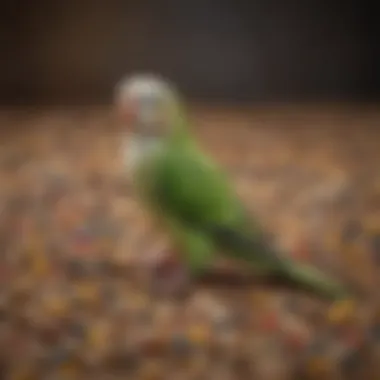
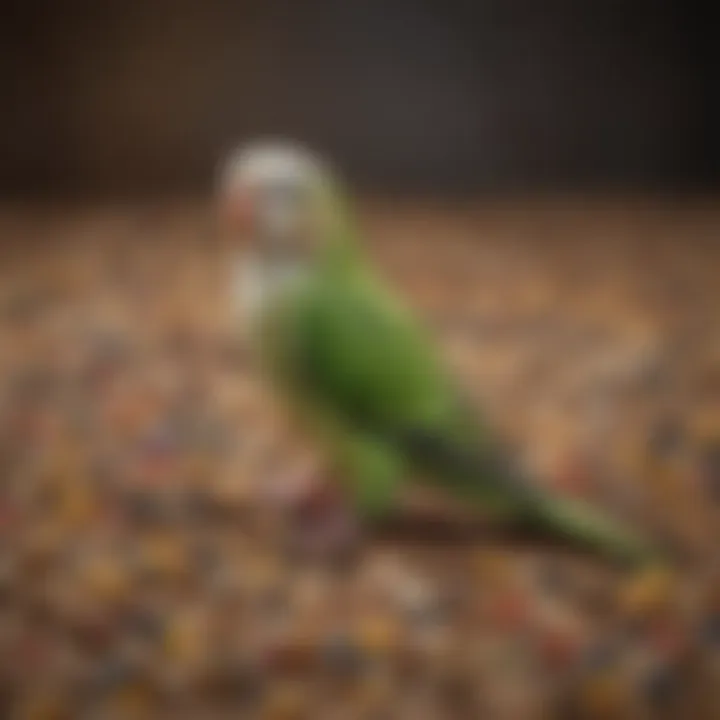
Intro
When it comes to caring for parakeets, selecting the right food is as crucial as choosing the right shelter or toys. These lively birds have specific dietary needs that can greatly influence their health and overall quality of life. Just like you wouldn’t feed a child candy for every meal, parakeets need a balanced diet to thrive. This guide breaks down the factors to look for when picking bird food, addressing everything from nutritional requirements to common pitfalls in feeding practices. Whether you're a newbie parakeet owner or have been around the block a time or two, navigating the food aisle can be tricky. Let's delve into the essentials to ensure your colorful companion gets the best nutrition possible.
Understanding Your Pet
Pet Behavior Basics
Grasping the basics of parakeet behavior can help you understand their feeding habits and choices better. Parakeets are naturally curious creatures who love to explore their environment. They'll peck at and taste new foods, which can be a great opportunity to introduce variety into their diet. However, keep an eye on them as they may also get overly excited about the wrong options.
Common Breed Characteristics
While there are many parakeet breeds, the most common one is the budgerigar, often just called the budgie. Budgies have a playful nature and enjoy social interaction. Feeding them requires awareness of their breed specifics; for example, some may be prone to obesity if overfed seeds instead of pellets or fresh vegetables.
Species-Specific Needs
Different species may have unique dietary requirements. For instance, larger parakeets like Alexandrine parakeets may benefit from higher protein levels than smaller breeds. It's essential to do your homework and know what your specific type of parakeet needs to keep their feathered bodies in prime condition.
Always remember: A diverse diet that mimics what they'd eat in the wild can contribute significantly to their well-being.
Pet Care and Maintenance
Feeding Guidelines
Establishing solid feeding guidelines is the first step to making sure your parakeet eats healthily. A well-rounded parakeet diet should include a quality seed mix, pellets, and fresh fruits and vegetables. The ratio of each can vary, but generally, about 60% pellets, 30% seeds, and 10% treats like fruits and greens can be beneficial. Consider adding things like bok choy or carrots to their menu.
Grooming Essentials
A neat and tidy parakeet not only looks good but feels good too. Regular bathing helps keep their feathers clean. Offering a shallow dish of water can encourage a splash, or you can use a gentle mist from a spray bottle. Grooming goes beyond just cleaning; trimming their nails when necessary can prevent discomfort and injury.
Hygiene Practices
Maintaining a clean environment is vital for your parakeet’s well-being. Regularly clean their cage, replacing water daily, and removing any uneaten food to prevent spoilage. This not only keeps your pet healthy but reduces any unwanted smells around the house.
Training and Development
Basic Commands and Skills
Training your parakeet can be a fulfilling and entertaining experience. Start by teaching simple commands like "step up" to initiate interaction. Use small treats, such as seeds, to reinforce positive behavior. Over time, this strengthens the bond between you and your feathered friend.
Behavioral Training Techniques
Behavioral training can help with issues like excessive squawking or biting. Consistency is key; ensure everyone in the family uses the same methods when interacting with the bird. Positive reinforcement will yield the best results.
Addressing Common Behavior Issues
Monitoring their behavior closely can help you address problems before they escalate. For example, boredom might lead them to develop undesirable habits like feather plucking. Providing various toys and opportunities for interaction can help keep them mentally stimulated.
Health and Wellness
Routine Vet Check-ups
Just like humans, parakeets need routine health care. Schedule regular visits to an avian vet to monitor their health and catch any issues early. Preventive care is always better than dealing with the consequences later.
Vaccination Needs
Vaccination is an essential part of avian health. Consult with your vet about what vaccinations your parakeet may need, especially if they will be around other birds. Vaccines can provide a strong defense against various diseases.
Recognizing Signs of Illness
Being attuned to any changes in your parakeet’s behavior is important. Signs of illness may include changes in eating habits, unusual droppings, or lethargy. Timely recognition can make all the difference in recovery, so don’t hesitate to consult your vet if something seems amiss.
Enrichment and Activities
Indoor vs. Outdoor Activities
While indoor activities may seem safer, outdoor experiences can offer incredible enrichment opportunities when supervised. Outdoor trips can expose your parakeet to natural sunlight, which is vital for their mood and vitamin D levels. Lightly harnessing them for outdoor exploration may become an exciting adventure.
Interactive Toys and Games
Boredom leads to mischief, so providing interactive toys is key. Toys that encourage foraging mimic natural behavior and can keep your parakeet entertained for hours. Rotate toys often to pique their curiosity and provide new challenges.
Socialization Opportunities
Parakeets are social creatures and thrive on interaction. If you have multiple birds, allow for some social time, but always keep an eye on the dynamics. Additionally, engaging in daily interactions with them will fulfill their social needs and create a stronger bond.
Understanding Parakeet Nutrition
When it comes to keeping our feathered friends healthy, understanding parakeet nutrition is of utmost importance. Selecting the right food is not just about filling a bowl; it's about ensuring a balanced diet that caters to the unique health needs of these vibrant little creatures. Proper nutrition influences everything from their overall well-being to their longevity. The right diet fosters spirited behaviors, helps maintain a healthy weight, and even supports their immune system against ailments.
To truly appreciate the intricacies of a parakeet's diet, one must delve into the specifics of their dietary requirements. Each bird is different, shaped by factors like age, activity level, and even species variations. By educating oneself about what makes a nutrient-rich meal for parakeets, pet owners can make informed choices that nurture and sustain their avian companions physically and mentally.
Overview of Parakeet Dietary Needs
Parakeets are naturally seed-eating birds, which means their diets in the wild consist primarily of varied seeds, grains, and plant material. This natural inclination is important to consider when selecting food. However, it's crucial to expand on that base by integrating a diverse range of nutrients that might not be available in seeds alone. Factors like age can significantly influence their dietary needs; young parakeets, for instance, require more protein for growth, while aging birds might need special attention regarding fats and fiber.
Essential Nutrients for Parakeets
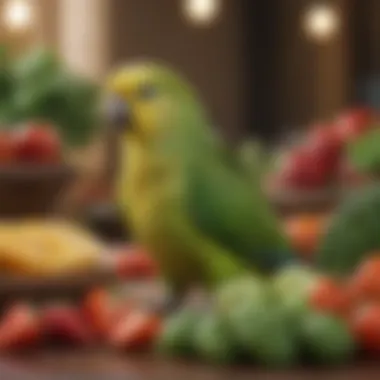
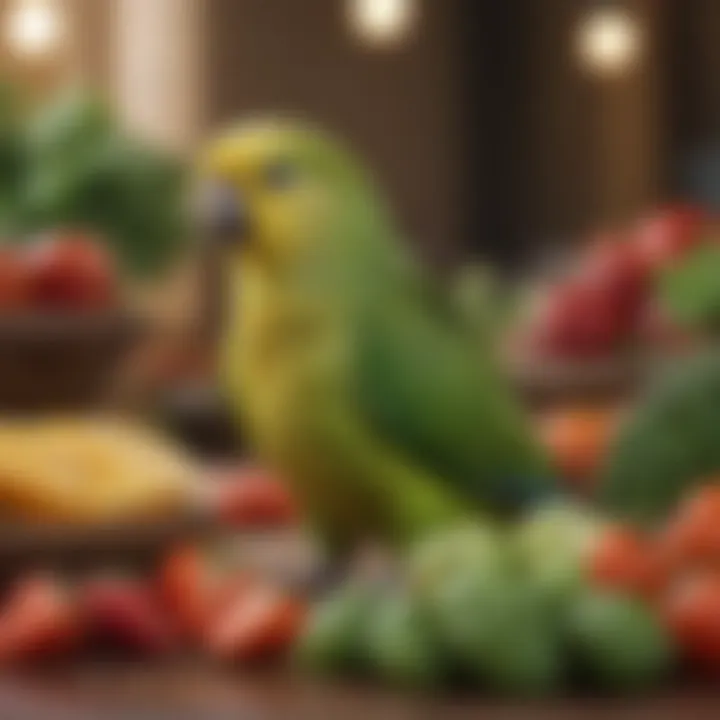
Having a diet rich in essential nutrients is not merely beneficial; it's paramount for maintaining parakeet health. Four main categories of nutrients are particularly vital. These are:
Proteins
Proteins are the building blocks of life for parakeets, crucial for growth, maintenance of body tissues, and overall health. High-quality protein sources such as legumes, cooked eggs, and some commercial pellets offer complete amino acid profiles essential for their well-being. One characteristic of proteins is their role in muscle development, making them particularly valuable for high-energy birds. However, it’s important not to overdo it, as too much protein can lead to health issues, underscoring the need for a balanced approach.
Carbohydrates
Carbohydrates, often viewed with skepticism in other diets, play an essential role in a parakeet's nutrition. Found in grains and vegetables, they serve as a primary energy source, fueling daily activities and keeping birds active and sprightly. The key aspect of carbohydrates for parakeets is that they come from whole food sources, providing not just energy but also fiber, which aids in digestion. However, like proteins, moderation is key, as excess carbs could lead to obesity in birds that are less active.
Fats
Healthy fats are another significant component of parakeet nutrition. They provide concentrated energy and help with the absorption of fat-soluble vitamins. Sources like avocados are to be avoided, but nuts and seeds in moderation can be excellent additions. One main characteristic of fats is their ability to promote healthy plumage when included in the diet. There's a fine line, however; too much fatty food can result in overweight birds, hence the importance of careful measurement and observation.
Vitamins and Minerals
Finally, vitamins and minerals are imperative for various bodily functions in parakeets. Vitamins like A, D, E, and a plethora of B vitamins play roles in everything from vision to skin health. Minerals like calcium and phosphorus are crucial for bone health. Special attention should be paid to sources like dark leafy greens and fortified pellets. A unique feature of these nutrients is that they are crucial not only in the growth phase but throughout a parakeet's life to maintain proper bodily functions. Deficiencies can lead to severe health issues, highlighting the importance of monitoring their intake carefully.
"To keep your parakeet chirping happily, remember: a balanced diet is key to a long and joyful life."
It's essential to pay close attention to the specifics when selecting parakeet food, emphasizing nurturing their individual dietary needs while integrating a variety of nutrients. The right mix fosters health, encourages play, and keeps them flourishing in an environment that honors their natural behaviors.
Types of Parakeet Food
Understanding the types of food available for parakeets is crucial. This knowledge not only helps in ensuring your feathered friend gets a balanced diet but also supports their overall health and happiness. The right diet can keep your parakeet chirping happily and even extend their lifespan. Hence, selecting from the various categories of parakeet food—commercial pellets, seed mixes, and fresh fruits and vegetables—should not be taken lightly. Let’s break down these options and their unique contributions to your pet’s diet.
Commercial Pellets
Commercial pellets are often touted as the gold standard in parakeet nutrition. They are scientifically formulated to meet the dietary needs of these small birds, offering a blend of proteins, carbohydrates, fats, vitamins, and minerals necessary for their well-being. A significant advantage of pellets is their uniformity. Unlike seed mixes, which can encourage selective eating—where birds pick their favorite seeds and discard the rest—pellets ensure that every bite is packed with nutrients.
When choosing the right brand, it is essential to look for high-quality pellets that are specifically designed for parakeets. Brands that are rich in fruits, vegetables, and other natural ingredients tend to be better.
"Pellets can be a real game-changer. A well-balanced pellet diet minimizes the chances of deficiencies that could lead to health issues down the road."
Seed Mixes
Seed mixes are a staple in many parakeet diets, but they come with some caveats. While they can be a source of enjoyment for your bird, the problem lies in their nutritional imbalance. Seeds often contain a high fat content and lack essential vitamins and minerals. Plus, if parakeets are left to their own devices, they may develop a preference for high-calorie seeds, which can lead to obesity and related health issues.
Mixes can be beneficial when used correctly, as they provide variety. That said, look for mixes that include a good proportion of grains, and avoid those that are overly high in sunflower seeds or other fatty components. Supplementing seed mixes with fresh food and pellets can help strike the right balance.
Fresh Fruits and Vegetables
Adding fresh fruits and vegetables to your parakeet's diet is like treating them to nature's candy. These foods are not just tasty but also rich in nutrients. Leafy greens, bell peppers, and carrots can provide hydration and essential vitamins, which store-bought foods sometimes lack. However, it’s important to wash and prepare these foods properly.
Some great options include:
- Carrots: Full of beta-carotene, good for vision.
- Broccoli: Packed with vitamins A, C, and K.
- Apples: A sweet snack, but remember to remove the seeds, as they are toxic.
Always introduce new foods gradually to avoid digestive upset. A classic approach is to offer one new item at a time. Over time, you’ll learn your parakeet's favorites.
In sum, understanding the different types of parakeet food can help you tailor a diet that’s both enjoyable and health-boosting. Mixing pellets with an occasional sprinkle of seeds and a medley of fresh fruits and vegetables could be your way to that optimal care.
Evaluating Food Labels
When it comes to choosing the right food for parakeets, understanding food labels is like having a map in unfamiliar territory. These labels provide valuable insights that can guide pet owners in making informed decisions, ensuring that their avian companions receive the best nutrition possible. Evaluating food labels opens the door to knowledge about what’s actually in the food and its effect on the bird’s health.
Food labels offer several key elements to consider. The first is the ingredients list. This will tell you what the food is made of, helping you to identify any harmful additives or unwanted fillers. For parakeets, you want to focus on foods high in quality seeds, grains, and fresh ingredients instead of things like artificial colors or preservatives. It’s similar to reading a resume – the most relevant and impactful experiences jump out at you right away.
Another beneficial aspect is the guaranteed analysis on the label. This section details the percentages of protein, fat, and fiber. Having a clear picture of these percentages allows owners to match the dietary needs of their parakeets with what's in the bag. If the food has low protein or high additives, it might be a red flag - much like finding a typo in a critical document. It simply raises questions about quality.
Ultimately, detailed label evaluation empowers pet owners and nurtures healthier, happier parakeets.
Understanding Ingredients
Ingredients hold the key to ensuring that pet parakeets receive a balanced diet. Each component listed on the food label tells a part of the story about nutrition. Parakeets require a diverse diet that includes grains, seeds, and various fresh produce. Notably, the first few ingredients listed are crucial since they make up the majority of the food. Look for ingredients like millet, canary seed, and high-quality pellets. Ingredients that are vague or overly processed, like "animal by-products", should be approached with caution.
Here is a brief look at some common ingredients to seek out:
- Millet: A favorite among many parakeets that provides carbohydrates and essential protein.
- Oats: These offer a fiber boost, which aids digestion.
- Vegetables:Fresh produce packed with essential vitamins for overall health.
By understanding what’s in their food, you maximize the nutrition your parakeet receives, contributing to their vitality.
Identifying Quality Indicators
High-quality bird food goes beyond just the ingredients. It’s crucial to look for certain indicators that assure the food’s nutritional integrity. This is where aspects such as organic certification and non-GMO status come into play. Both of these indicators can impact the long-term health of your feathered friend.
Organic Certification
Organic certification signifies that the ingredients are free from synthetic pesticides and fertilizers. This aspect is an important consideration for pet owners seeking natural solutions. The prominent characteristic of organic certification is its holistic approach to farming and production. Investing in organic options often means fewer chemicals in your pet’s diet, which can be vital for their overall well-being.
A unique feature of organic certification is that it often includes guidelines on farming practices, ensuring the feed is grown in harmony with the environment. This naturally leads to healthier produce. The advantages of choosing organic are clear: it generally boosts nutrient levels in foods. However, be aware that organic products can also come with a heftier price tag. It’s a matter of balancing health benefits with your budget.
Non-GMO Status
Non-GMO status indicates that the food does not contain genetically modified organisms. This aspect addresses concerns about potential health impacts from consuming genetically altered ingredients. The key characteristic of non-GMO status is that it typically supports natural farming practices, allowing for a more traditional approach to food quality.
One of the unique features of foods with non-GMO status is that they often maintain the original characteristics of the crops, resulting in more nutritious and flavorful ingredients over time. Many pet owners prefer non-GMO products because they align closely with their broader values, emphasizing the importance of natural diets. Advantages include better digestibility and fewer adverse effects on overall health. Therefore, it’s a smart choice for those invested in the long-term health of their parakeets.
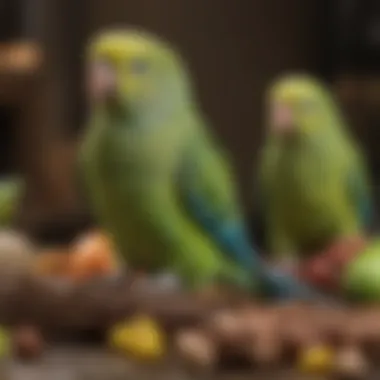
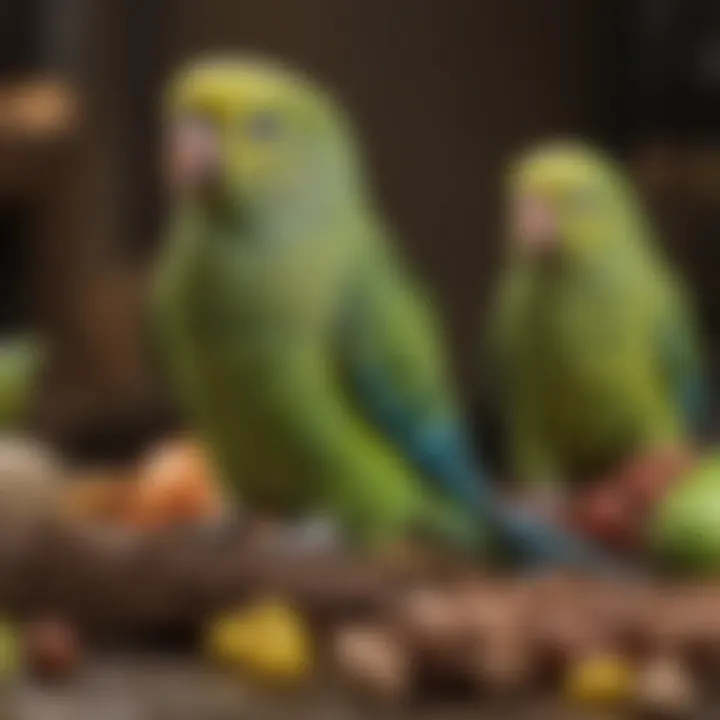
Age and Activity Level Considerations
When it comes to the health and vitality of parakeets, understanding how age and activity level influence their dietary needs is crucial. Young, adult, and aging parakeets have distinct requirements that influence not only their health but also their behavior and overall quality of life. Just like with people, dietary needs can shift significantly over time. This section delves into the different feeding considerations based on these elements, empowering pet owners to make the best choices for their feathered companions.
Dietary Needs for Young Parakeets
Young parakeets, particularly those who are weaning or just starting to eat solid foods, require a nutrient-dense diet to support their rapid growth and development. During this stage, it’s not just about filling their little crops; it’s about feeding them what can truly help them thrive.
- Protein: Their diet should be rich in proteins to aid in muscle development and feather growth. This can come from high-quality pellets or seed blends designed for young birds.
- Variety: Introduce a mix of soft fruits and veggies, which not only provide essential vitamins but also introduce different textures. Think mashed bananas or steamed carrots.
- Frequent Feeding: Young parakeets benefit from multiple small meals throughout the day rather than one or two larger feedings, as they have tiny stomachs.
"A young parakeet’s diet needs to be like a well-rounded life; variety is the name of the game."
Nutritional Requirements for Adult Parakeets
Once parakeets reach adulthood, their nutritional needs stabilize, although they still require a well-balanced diet to maintain health and energy.
- Pelleted Diet: A base of high-quality pellets should form the majority of their diet. Pellets are designed to provide all essential nutrients, helping to prevent selective eating habits common with seed diets.
- Fresh Produce: Daily servings of fresh vegetables and a smaller portion of fruits remain important. Leafy greens like spinach and kale offer great nutritional value.
- Activity Level: An active parakeet may require more calories than a less active counterpart. Pay attention to their play habits to ensure their diet aligns with their energy expenditure.
Adjustments for Aging Parakeets
As parakeets age, their metabolism and activity levels may decrease, necessitating adjustments in their diet to avoid health issues like obesity or nutritional deficiencies.
- Low-Calorie Options: Older parakeets may need diet adjustments, leaning toward lower-calorie options. Leaner pellets or a decrease in seed quantities can prevent weight gain.
- Easily Digestible Foods: Soft, easily digestible foods can be beneficial, as older birds might have trouble with harder seeds or pellets. Something like cooked quinoa or soft mashed sweet potatoes can be delightful.
- Continuous Monitoring: Keep a keen eye on your older bird's body condition. Some may need special diets due to conditions like liver disease or kidney issues, which may require consultation with a veterinarian.
By tailoring parakeet diets according to age and level of activity, owners can contribute significantly to the health and happiness of their birds. It’s not just about what to feed them; it’s about understanding their evolving needs and recognizing that a little care goes a long way in their well-being.
Common Myths About Parakeet Feeding
Understanding the common myths surrounding parakeet feeding is crucial for pet owners who want the best for their feathered companions. These myths can lead to nutritional missteps that could inadvertently compromise the health and happiness of these lively birds. By debunking these misconceptions, one can foster a more informed approach to parakeet care, ensuring that these delightful pets thrive in a healthy environment.
Myths Surrounding Seed Diets
One persistent myth is that a seed-based diet is all that parakeets require for optimal health. Many pet owners believe that as long as their parakeet has access to a variety of seeds, they are providing a complete diet. However, this is far from the truth. Seeds tend to be high in fats and low in essential nutrients, leading to serious health issues such as obesity and malnutrition over time.
"A well-rounded diet needs much more than just seeds to keep your parakeet happy and healthy."
Seeds can be an enjoyable treat when offered in moderation, but relying solely on them can be detrimental. A balanced diet for a parakeet should include pellets, fresh fruits, vegetables, and occasional seeds. This blend ensures that they receive proteins, carbohydrates, essential vitamins, and minerals needed for their overall vitality. Ignoring this can lead to serious conditions, such as hepatic lipidosis, caused by excessive fat intake.
Misconceptions Regarding Fresh Foods
Another common misconception is that introducing fresh foods to a parakeet’s diet is unnecessary or even harmful. Some owners shy away from offering fresh fruits and vegetables due to a fear of over-saturation or because they think their birds may not like them. In reality, fresh foods are vital sources of hydration and essential nutrients that can significantly enhance a parakeet’s diet.
While it’s true that not all birds will instantly take to fresh produce, many will develop a taste for it over time. Offering a variety of colors and textures can spark their interest. Here are some fresh foods that many parakeets enjoy:
- Leafy greens: Kale, spinach, and romaine
- Fruits: Apples, bananas, berries, and melons
- Vegetables: Carrots, bell peppers, and sweet potatoes
It's essential to introduce these foods gradually, allowing the parakeet to adjust and discover flavors they enjoy. Concerns about pesticides can also deter owners; however, opting for organic produce or thoroughly washing fruits and vegetables can mitigate these worries.
Home-Made Food Options
Creating a nutritious diet for your parakeet can greatly enhance their overall health and happiness. One effective way to ensure your feathered friend receives the right balance of nutrients is by considering home-made food options. These options allow you to control the ingredients, ensuring freshness and quality, which is often lacking in some commercial diets. Moreover, making your own food can cater specifically to your parakeet's preferences and specific dietary needs, leading to a more enjoyable mealtime experience.
While many pet owners may lean towards pre-packaged foods for simplicity, preparing home-made meals can be both rewarding and beneficial for your parakeet's wellbeing. Let's explore how you can create balanced meals and the necessary safety precautions to take when preparing your avian friend’s food at home.
Creating Balanced Meals
Creating a balanced diet for your parakeet hinges on providing a variety of food that incorporates essential nutrients. A well-rounded meal should consist of:
- Fresh vegetables: Dark leafy greens like kale, spinach, and romaine are excellent options. They contain vitamins A and C, which are fundamental for your bird's immune system.
- Fruits: Small pieces of fruits such as apples, bananas, and berries can be included as treats. These provide essential vitamins and are a natural source of sugar.
- Whole grains: Brown rice, quinoa, or whole grain pasta add necessary carbohydrates and fiber.
- Proteins: Cooked legumes like lentils or chickpeas can serve as protein sources, along with small amounts of cooked eggs or nuts.
For example, a simple home-made blend can include a mix of chopped kale, shredded carrots, diced apple, and a sprinkle of quinoa. It’s easy to prepare and is packed with nutrients!
When preparing these meals at home, it's critical to remember to tailor the meals based on your parakeet’s age and health considerations. Consulting resources, such as Wikipedia's Avian Nutrition page, can be beneficial in ensuring you're aware of what to include and what to avoid.
Safety Precautions in Homemade Diets
While the prospect of home-made food is appealing, it’s important to take certain safety measures to ensure your parakeet remains healthy. Here are a few guidelines:
- Wash Ingredients Thoroughly: Always wash fruits and vegetables carefully to remove pesticides and bacteria. Avoid using any products that are not meant for food cleaning.
- Avoid Harmful Foods: Certain foods, like avocado, chocolate, and caffeine, can be toxic to birds. Research and double-check what foods are safe before introducing new items into your bird's diet.
- Proper Storage: Store any left-over food properly. It’s best to keep it refrigerated and dispose of it after a few days to prevent spoilage.
- Monitor Portions: As with any diet, portioning plays a significant role. Ensure that the amount given is appropriate for your parakeet’s size and activity levels. \n
"A balanced diet is not just a bird's breakfast; it's the foundation of a happy, thriving parakeet."
Adhering to these principles when preparing home-made food not only ensures your parakeet gets the best nourishment possible but also deepens the bond you share with your pet. The act of creating tailored meals can prove to be rewarding for you, leading to a healthier and happier companion.
Feeding Practices
Feeding practices play a crucial role in maintaining the health and well-being of parakeets. When it comes down to selecting the right diet, establishing effective feeding routines can mean the difference between a lively, playful bird and one that’s lethargic or unwell. An optimal feeding strategy must consider the right intake frequency, portion sizes, and the types of food offered.
Key elements of good feeding practices include:
- Understanding individual dietary needs based on age, activity level, and health status
- Incorporating variety in food choices to prevent boredom and ensure balanced nutrition
- Monitoring changes in eating habits, which may signal health issues
To ensure that your parakeet thrives, being informed about proper feeding practices is indispensable. Not just about filling the food bowl, it’s more about creating an environment where your feathered friend can flourish.
Establishing a Feeding Schedule
Establishing a feeding schedule is one of the most beneficial steps you can take in caring for your parakeet. Birds are creatures of habit, and having a consistent feeding routine can help maintain their emotional and physical health. Feeding at the same time every day can set a rhythm in their daily life, leading to less anxiety and more contentment.
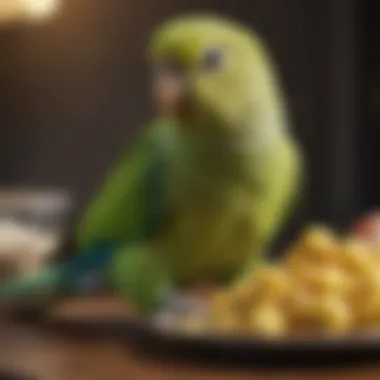
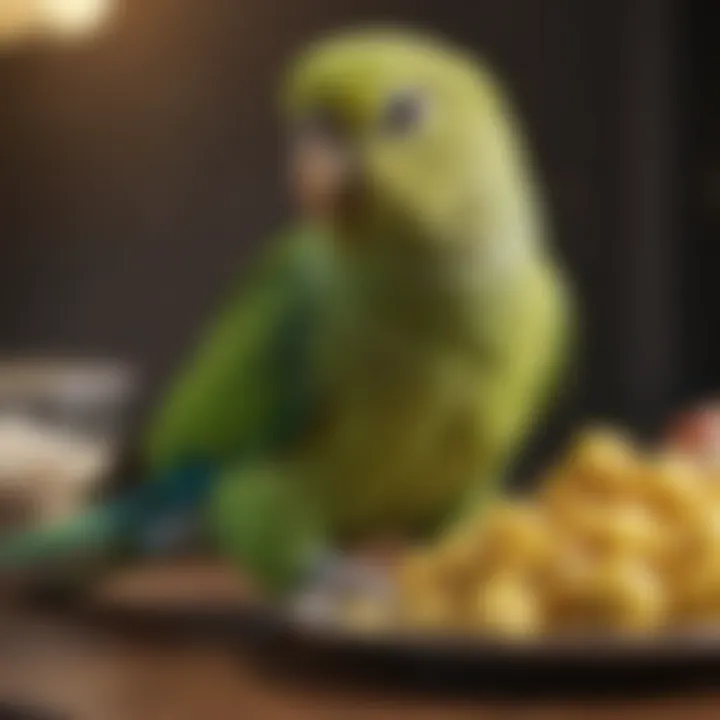
It is usually recommended to offer food in the morning when they are most active. Monitoring how much food your bird consumes will also guide you in adjusting serving sizes or frequencies. For instance, if you notice that your parakeet consistently leaves food uneaten, it may be worthwhile to reduce portion sizes.
Keep in mind that parakeets eat best when they feel energized, so aligning feeding time with their active periods can stimulate keener eating habits.
Portion Control for Optimal Health
Portion control is essential for ensuring your parakeet remains in tip-top shape. Overfeeding can lead to obesity, which can bring forward a host of health complications. When serving their meals, consider these factors:
- Age and activity level: Younger and more active birds might require larger portions than older ones who may be less active.
- Nutrient density of food: A high-quality pellet may offer more nutrition in smaller servings compared to seed mixes that might require larger portions.
- Monitoring weight changes: Keep track of your bird’s weight; fluctuations may indicate dietary adjustments are needed.
Offering fresh food in appropriate portions helps reduce waste while ensuring your bird receives the nutrients it needs. As a practice, once uneaten food has been sitting for a couple of hours, it should be removed to promote freshness and hygiene.
"The key to a healthy parakeet diet isn’t just what you feed them, but how and when you feed them."
In summary, both establishing a feeding schedule and practicing portion control are vital components of your parakeet’s care routine. They enhance your pet's satisfaction and prevent health issues down the line. A balanced approach in these practices can lead to a happier and healthier bird.
Signs of Dietary Deficiencies
Recognizing the signs of dietary deficiencies in parakeets is crucial for any pet owner seeking to ensure their feathered friend lives a long, healthy life. Poor nutrition can lead to a myriad of health problems, and catching these signs early can make all the difference. If you want your parakeet to flourish, staying informed about its dietary needs is a step that can't be overlooked.
Behavioral Changes in Parakeets
Parakeets, like other pets, often show significant changes in behavior when they’re not getting the proper nutrients. A parakeet that suddenly becomes more withdrawn or less active might be sending a red flag that something's off with its diet. This change can sometimes be subtle. For instance, if your bird used to be the life of the party, chatting and chirping up a storm, but now sits quietly in the corner, it could be feeling underfed or unwell.
Other warning signs may include:
- Aggression or irritability: A normally friendly parakeet may become nippy or irritable due to discomfort or lack of energy.
- Feather plucking: This distressing behavior can occur if the bird is nutrient-deficient, as birds often turn to feather plucking when they’re stressed or uncomfortable.
- Changes in vocalization: If your bird's songs become less melodious or frequent, it might be worth checking its food.
Observing these behavioral signals is important. If you notice any shifts, consult a veterinarian who specializes in avian care. They can offer specific advice tailored to your parakeet's unique needs.
Physical Symptoms to Watch For
In addition to behavioral changes, parakeets may display physical symptoms that indicate nutritional deficiencies. These signs can sometimes be easier to spot but still require your attention.
Some physical signs to look for include:
- Dull or ruffled feathers: Healthy feathers should be smooth and vibrant. If their sheen is gone and feathers appear messy, your bird might not be getting enough protein or vitamins.
- Weight loss or poor body condition: A parakeet that is losing weight or feels bony when you gently grasp its body may not be eating enough nutritious food.
- Discoloration of the beak or skin: A beak that loses its vivid color or appears flaky can indicate a deficiency in important minerals or vitamins.
- Changes in droppings: Abnormal droppings, like excessively watery or excessively dry stool, can reflect what’s happening inside your bird's digestive system, signaling dietary issues.
Important: Don't wait too long to address these signs. The earlier you consult with a veterinarian, the better chances your parakeet has for recovery.
Overall, monitoring your parakeet's behavior and physical well-being is essential for keeping it healthy. By being proactive in understanding these signs of dietary deficiencies, you set the groundwork for a happier and healthier parakeet.
Consulting with Avian Experts
When it comes to ensuring your parakeet thrives, consulting with avian experts is not just a suggestion, it’s often a necessity. These professionals bring a wealth of knowledge that goes beyond everyday observations. They can clarify what you might overlook or misunderstand about your bird's diet.
In the wild, parakeets have a diverse diet, which keeps them healthy and vibrant. Replicating this in captivity, however, can be a tricky endeavor. Often, pet owners may rely on trial and error, leading to unintended consequences—nutritional deficiencies, obesity, or other health issues. This is where avian experts step in to illuminate the nuances of avian nutrition, enabling bird owners to choose food that suits their pets best.
"Your parakeet's diet is a foundation for its health. Ignoring expert advice could mean compromising that foundation."
When to Seek Professional Guidance
There are several pivotal moments where reaching out to an avian expert becomes particularly important. One of these is when adopting a new parakeet or transitioning to a different diet.
- Dietary Changes: Switching food brands or introducing new types of food calls for expert opinion. Different brands or homemade diets might offer various levels of essential nutrients, and getting a second opinion ensures the change supports your bird’s health.
- Health Concerns: If you notice atypical behavior or physical symptoms such as feather plucking, lethargy, or changes in appetite, consulting with an expert can identify if these signs are related to diet or require a different approach.
- Life Stages: As parakeets grow older, their nutritional needs shift significantly. Young birds require different nutrients compared to adults or seniors. Experts can guide on the appropriate diets based on your bird's life stage.
The Role of Veterinarians in Diet Management
Veterinarians, especially those specialized in avian care, play a crucial role in diet management. They possess both the qualifications and practical experience necessary to help you formulate a balanced diet for your parakeet.
- Nutritional Assessments: They are trained to evaluate your parakeet’s current diet. Through examinations, they can tell if the bird is receiving all necessary nutrients or if adjustments are needed.
- Customized Diet Plans: Sometimes, a one-size-fits-all approach doesn’t cut it. Based on your parakeet’s individual needs—whether it be activity level or health conditions—veterinarians can create customized feeding plans that enhance the bird's longevity and well-being.
- Education: A well-informed owner is a better caregiver. Veterinarians can enlighten you on the myths surrounding bird diets and help separate fact from fiction. They clarify which foods are toxic and which can be included safely.
- Follow-up Care: Regular consultations can help in monitoring changes and adjusting the diet as required. Keeping an ongoing relationship with a vet ensures that your pet gets the best possible care as behaviors or health needs evolve.
Overall, engaging with avian experts and veterinarians sheds light on how to best nourish your parakeets. Their insights provide invaluable guidance to ensure you're not just meeting your feathered friend’s basic needs but are actively promoting a fulfilling, vibrant life.
Long-Term Implications of Diet on Bird Health
The way we feed our parakeets can set the tone for their long-term health and happiness. Just like humans, a balanced diet is crucial in determining a bird's quality of life. It’s not just about what they eat today; it’s about how those choices ripple through their lifespan.
Understanding the significance of a proper diet is paramount for parakeet owners who aim for the best care possible. A well-rounded diet can help prevent numerous health issues down the line, ensuring that your feathered friend leads a vibrant and joyful life.
Connection Between Nutrition and Lifespan
A parakeet's diet has a direct correlation with its lifespan. Birds that receive a varied and balanced diet tend to live longer and exhibit more vitality. Essential nutrients such as proteins, vitamins, and minerals play a critical role in cell structure and function. It is only through these building blocks that parakeets can maintain strong immune systems and energy levels.
For instance, a parakeet fed primarily seeds might live six to eight years, while a well-fed bird on a balanced diet could easily reach twelve years or more.
"What you put in is what you get out."
When considering key nutrients, keep in mind the following:
- Proteins: Crucial for growth, repair, and overall energy.
- Vitamins A, D, and E: Vital for skin health, eyesight, and reproduction.
- Minerals like calcium: Necessary for strong bones and beak structure.
Feeding your parakeet a variety of foods—like pellets, fruits, and vegetables—provides a broad spectrum of these essential nutrients. Ensuring that your bird gets a continual influx of these nutrients significantly enhances their chances of living a longer, healthier life.
Influence on Behavioral Well-being
Just as diet affects physical health, it has an impact on a parakeet's mental and emotional well-being. When parakeets lack necessary nutrients, it can lead to behavioral issues, like lethargy or aggression. Birds that receive proper nutrition are typically more sociable and active.
A well-nourished parakeet is likely to display a range of positive behaviors:
- Engagement in Social Interactions: Nutrient-rich food supports brain health, leading to better interaction with their owners and other birds.
- Playfulness and Activity: Proper nutrition fuels energy, encouraging play and exploration.
- Stress Resistance: A balanced diet supports a robust immune system, contributing to lower stress levels in birds.
To foster a healthy diet, consider integrating behavioral-enriching foods, such as:
- Fresh leafy greens, which not only provide vitamins but also give birds something to chew on.
- Crafting simple foraging games with small treats hidden amongst vegetables can stimulate your parakeet’s mind.







